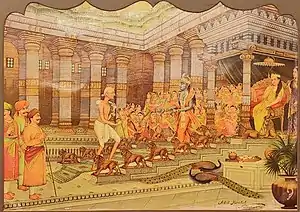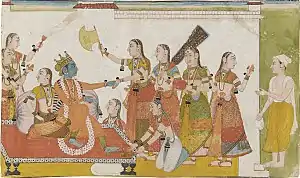Sudama
Sudama (Sanskrit सुदामा IAST Sudāmā also known as Kuchela, mostly in southern India) was a childhood friend of Hindu deity Krishna from Mathura, the story of whose visit to Dwaraka to meet Krishna is mentioned in the Bhagavata Purana.[1] He was born as a poor man in order to enjoy transcendental pastimes.


Apparently, Sudama was from Porbandar. In the story, he travelled from Sudamapuri to Beyt Dwarka. Sudama and Krishna had studied together at the Sandipani Ashram in Ujjayini.[2]
_LACMA_M.83.219.3.jpg.webp)
Sudama was born in Brahmin Varna (Caste). His father's name was Matuka and his mother was Rochana Devi. Krishna was from the royal family and the avatar of God Vishnu. But this difference in socioeconomic status did not come in the way of their education (Gurus in ancient times used to treat all pupils the same). All pupils had to do odd jobs for the Guru and once Krishna and Sudama were in the forest to get wood. It started to rain and so they went under a tree. Sudama had some beaten rice for a snack. Krishna all-knowing said he was hungry. Sudama first said that he didn't have anything however seeing Krishna's need shared his rice with him. Lord Krishna told him beaten rice was his favourite snack. Their friendship blossomed. When they grew up they went their separate ways. They lost contact over the years and while Krishna became a powerful part of the ruling family of great repute at Dwaraka, Sudama remained a humble and somewhat impoverished villager.[3]
Sometime later when Sudama was going through extreme poverty, not even having enough money to feed his children, his wife Susheela reminded him of his friendship with Krishna. Sudama didn't want to go and ask for favours from King Krishna. He thought that is not a good use of friendship and lived within his means. One day Krishna visited him (the all-knowing God knew his friend had fallen on hard times). Sudama was so ashamed of his poverty, he didn't invite Krishna into his house. Krishna jokingly asked him to serve a snack as he was a guest (guests are supposed to be treated as gods). Sudama, despite his poverty, went inside and got the last grains of beaten rice (he remembered beaten rice is Krishna's favourite). Krishna ate the snack with relish and left with pleasantries. When Sudama turned back to go into the house, he couldn't believe his house changed to a palatial mansion instead of a hut. He also found his family inside dressed in opulent garb and waiting for him.
Sudama goes to Krishna to ask what happened (again taking a gift of beaten rice for his friend). Krishna is greatly pleased to see his old friend. He treats him royally and with much love. Overwhelmed by all these Sudama cries and Krishna says "I love beaten rice you have always offered me" (going by ritual, before food is eaten, it is offered to God). When Sudama leaves Krishna explains to everyone in the palace, "All I have given him is only because of his devotion". Krishna cares about his bhakt so much. On his return journey, Sudama ponders his circumstances and is thankful for the great friend he has as Lord Krishna and lives an austere life after that, always thankful to the Lord. This miracle of faith and friendship of God Krishna and Sudama in Dwarka, is associated with the celebration of the festival of Akshaya Tritiya.[4]
Sudama is not mentioned anywhere in the very ancient scriptures Mahabharata, Harivamsa or Vishnu Purana. The story of Sudama is very popular in Bhagavata Purana.
Lessons


This story is told to illustrate that the Lord does not differentiate between people based on their financial status and that he will reward devotion always. Another moral taught by this story is to never expect anything free in life; God will provide for your good deeds. Another moral is not to trade bhakti for anything in return. Sudama did not ask Krishna for anything. Despite being poor Sudama had given Krishna everything he had (poha); in return, the Lord gave Sudama everything he needed.
There is also a lesson about how Krishna rewards true persons. Krishna did not reward Sudama just because he was a friend. Sudama spent all of his time and effort in cultural efforts befitting a true person which explained why he was financially not well off. This included teaching religion, moral duties, and spreading spirituality through society. It is for this effort that Krishna rewards Sudama's family with wealth so that Sudama may continue to do that work.
Gift
Sudama was Lord Krishna's classmate and a very intimate friend. Lord Krishna was a King. Sudama was an impoverished poor Brahmin. This difference did not come in the way of their true friendship. Sudama went to Dwarka to meet Krishna. He carried a very humble gift to be presented to Lord Krishna. What did he carry? Some books say he carried pohe (beaten rice), while some books and movies say he carried sattu powder (peeth). This confusing difference is because Sudama carried neither sattu nor pohe. He carried with him a combination of sattu and pohe called "sattu-peeth pohe" or Atukulu in Telugu. It is an exclusive prominence of Samvadi Lad Brahmins to which Sudama belonged. That Sudama was a Samvadi Lad Brahmin is more or less widely accepted; whether his home town was Bhurgakacha (Bhadoch) or Porbandar is a point on which a minor difference of opinion exists.
Shri Krishna-Sudama is an immortal example of real, non-materialistic friendship. It is a perpetual symbolic definition of real friendship. Sattu-peeth pohe is a very tasty, ready-to-serve, easy-to-carry food. In it, poha (beaten rice) is smeared with sattu while it is fried. Sattu peeth is prepared from grama (phutana) and wheat flour.
Adaptations
- Kadha Parayumbol (2007)
- Kuselan (2008)
- Billu (2009)
- Dwarkadheesh (2011)

